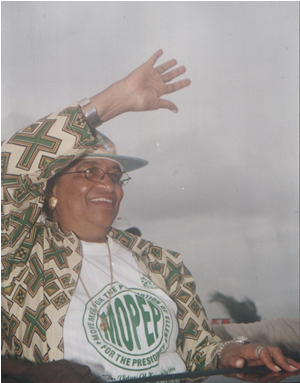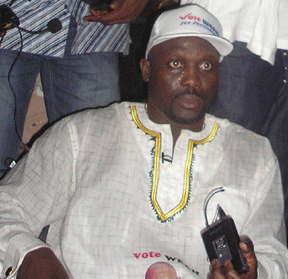
A Case of Faulty Arithmetic –
A Rejoinder to J.M. Addy’s “ Did Liberian
Voters Reject George Weah?”
By George Yuoh
The Perspective
Atlanta, Georgia
October 21, 2005
 |
 |
|
Ellen Johnson-Sirleaf
|
George Weah
|
The Distortions
Mr. Addy weakly and erroneously opined that because Amb. George Weah won about 30% of the populous vote; it means that he (Weah) was rejected by the Liberian voters. And without considering other factors like, the total number of presidential candidates, number of voters, number of counties won, etc., Mr. Addy crudely summarized that because the next five candidates combine for about 53.4% to Weah’s 30%, therefore …George Weah is a weak candidate with very little national appeal and does not enjoy the majority support of the Liberian people.” What a joke! Simple arithmetic should tell you that one and five are not the same; and comparing the numbers of one candidate (Weah) to the combined total of five others, and then drawing conclusions on that basis is synonymous to practicing “fussy math”. But that is the type of analysis Mr. Addy expects intelligent people to agree with.
More than that, Mr. Addy labored in vain in his efforts to distort the issues on which these elections are based. He argues that the voters were particular about who had the most PhD degree and the longest political resume; he also tried to beg all his “educated candidates” to rally behind his “educated” candidate, and blah blah blah. Did he not see the campaigning and the slogans, and the expressions of the Liberian people? Did he not see how our people stood in the blazing sun and in some instances, in the pouring rain to make their voices heard? But for the sake of argument, let me tell him why our people voted the way they did. These votes were the expressions of a bitter and deceived people, who decided that they were not going to be deceived any more. These votes were about trust, and the confidence of the people to place their hope in someone who they believe would think about them first, and at all times. These votes were coded as well as overt messages to sound out to the “career politicians” and the “political elites” that there must be a change to their politics of self- interest only. The people spoke very loud and clear!
Numbers are Facts
Let’s take a look at what the numbers say, as opposed to Mr. Addy’s joke. First, given that there were 22 candidates in the race, and assuming that each had equal chance of collecting votes, the average percentage distribution of votes per candidate spread equally is 4.55%. George Weah alone took about 30%, which is 25.45% more than the average. Mr. Weah beat the rest of the 21 candidates convincingly, and won his closest opponent by close to a staggering ten percentage points. That is an exceptional performance, again, given the number of candidates.
But let’s turn our attention to what the Liberian voters actually said, reading from the way they voted, and not by the derisory figures that Mr. Addy wants us to believe exist. There are 15 political sub-divisions (counties) making up Liberia. Out of that number, George Weah won six (6) counties outright (that is about 40% of the total), including the two most populous counties, Montserrado and Nimba. In addition to that, Mr. Weah came second in seven (7) other counties (about 46.67% of the total), including Grand Bassa and Bong Counties, the next two populous counties after Montserrado and Nimba. When you combine those two results, you have thirteen (13) counties (about 86.67% of the counties) that believe Mr. Weah may be the better and or best candidate to lead Liberia into a “brighter future”.
Now let’s turn our focus to another voting trend that should punch big holes in Mr. Addy’s yarn of an analysis. During the first round of voting, regional and or ethnicity played more than a key role in how the voters decided who they trust to be their president. In most cases, they voted along regional and or ethnic lines. Let’s take a few examples here. Joseph Korto came second to George Weah in Nimba with 21.9% of the votes from his county, but did not win votes in any other county. Charles Brumskine won Grand Bassa and Rivercess with 58% and 46% respectively, but didn’t do anything anywhere else except in Montserrado where he collected about 12% of the votes. Winston Tubman’s only showings were in Maryland and Bong (because of his vice presidential candidate) where he won 31% and 42% respectively. But for George Weah, he swept the entire southeast, except for Maryland where he came in a very respectable second. In the central region, Mr Weah took Nimba and came second in Bong. In the western region, Mr Weah came second in Cape Mount, Bomi and Gbarpolu. In the south-central areas, Mr. Weah won Monsterrado and again came a very respectable second in Grand Bassa and Rivercess. (Se the NEC election results @ www.necliberia.org) So, except for Lofa in the northwest and Margibi (he came 3rd) in the central region, George Weah received very substantial votes from every corner of Liberia. How nationally does Mr. Addy want the votes to be again? Coming first, second or third in 14 out of 15 counties is more than a national acceptance. It is a testament that George Weah is indeed the common bound that holds together our collective expectations for a peaceful and prosperous Liberia. So say the voters in Liberia, and no amount of distortion will change that.
The Voice of the People
The people of Liberia, including the educated and uneducated, the young and old, men and women, the haves and the have-nots, friends and foes alike, spoke emphatically that these elections are about selecting people who they feel comfortable, people who they can trust their future, and the future of their children’s children to. They voted for people who they felt would better seek their collective interest and well-being. They challenged the status quo, and showed their beliefs in the democratic process. In the run-off, they will again stand firm in their trust for a candidate who will put Liberia first, and at all times.
There are many among us who will want us to think that are people are fools. They often make comments like, “the Liberian people do not know what they want”. Well guess what? They know oh so well! And if you created the conditions for them to distrust you and your candidates, they certainly will. Our people know very well who deceived them in the past, and they know who stood with them during their hours of distress and need. They are not “stupid”, rather, they are loyal and they will not hesitate to express that loyalty anytime! The late legendary reggae prophet, Robert (Bob) Marley said, “…you can fool some people sometime, but you can not fool all the people all the time…” So now, the people have seen the light, and they will stand up for their rights! And you will hear the echoes and feel the vibrations of their voices when they speak again during the run-off. Liberia for always!!
